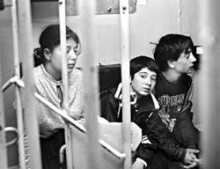A criminal is a criminal, and punishment is all that they deserve. This is the pattern governing the way Ukraine’s law-enforcement bodies work today, which is why adult offenders and maladjusted children are sentenced identically. In the democratic world, juvenile justice is a link in the judicial system that protects minors in their conflicts with society and the law.
Last Tuesday Kyiv hosted a meeting of experts from CIS countries, the Baltic states, and Poland to discuss this situation, exchange experience, and solve problems.
Here are some self-explanatory figures: out of nearly 3,000 child inmates of correctional facilities, 41 percent did not attend school or work. Every year 70 to 90 illiterate schoolchildren end in these institutions. Each day in a colony reduces the chances of a child learning what a normal child would learn at the age of five or six and embarking on a normal social life.
“Today they are children, but tomorrow we will be handing our state to them,” said Serhii Hubin, head of the National Press Club of Reforms, opening the conference. The situation is far from rosy. A child that has committed a crime is apprehended by law- enforcers, who treat him as a criminal, and the mechanism of his “reeducation” practically does not differ from the one applied to adults. A judge hears the case and hands down a sentence, guided by the Penal Code or other standard-setting instruments. Yesterday, a judge tries a psychopathic serial killer, today he sentences a child, and his sentencing of the latter does not reflect any specific approach.
The pivotal principle of juvenile justice is concern for the child’s further destiny. “After committing a crime, the child should not go to a judge who will find a respective article in the code but to the one who will reflect upon the child’s further life,” says Valeria Lutkovska, Ukraine’s Deputy Minister of Justice. In other words, it is a question of prevention and rehabilitation, not punishment.
Jeremy Hartley, UNICEF’s representative in Ukraine, is convinced that “by serving a term in a penitentiary, children are in an even shakier situation.” This is a time when children in prison start becoming totally asocial, and they will find it very hard to return to society later. While their peers are going to school, applying to a university, and mapping out plans for the future, children behind bars drop out of this process, and begin to bear the stigma of a convict. This means the end at the very beginning of life.
“A concept of a juvenile judicial system has been drawn up in Ukraine today; all we have to do is put it into practice,” Lutkovska says. This concept is based on such principles as supremacy of the interests of minors, priority of the rehabilitative approach over the punitive one during trials of children, and recognition and support of the family as the best place for a minor.
In the post-communist space, the state of juvenile justice differs from country to country. Kazakhstan has opted for a different way. “We began with practice: we organized centers of juvenile justice in some regions of the country,” says Svetlana Bekhmambetova. “There is a positive result: the number of arrests among minors is on the decline, and they are being rehabilitated outside of penitentiaries. Now we are drafting a concept, and the government has approved our ideas.”
The state of the juvenile justice system in Ukraine is a question of time and degree to which the authorities are interested in this. According to Mykola Zamkovenko, deputy chairman of the Verkhovna Rada’s Committee for Legal Policies, parliament is not exactly enthusiastic about the idea. The institution of a “children’s ombudsperson” could be an element of this specialized justice even now. However, Nina Karpachova, acting Verkhovna Rada Ombudsperson for Human Rights, is skeptical about this idea.
A new ombudsperson is going to be elected soon, and things may change. So there is hope that a system of juvenile justice will be established in Ukraine.







